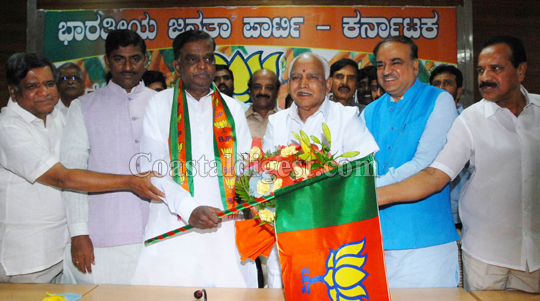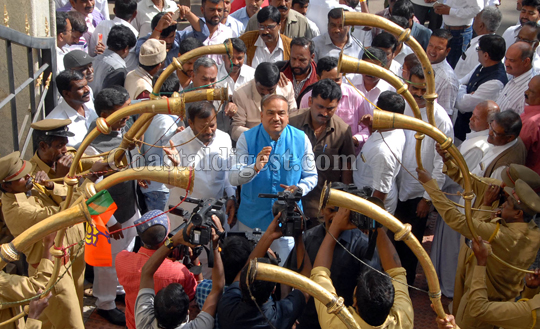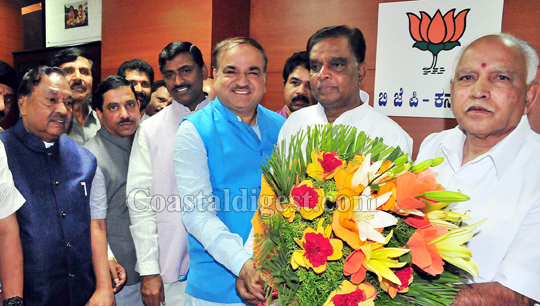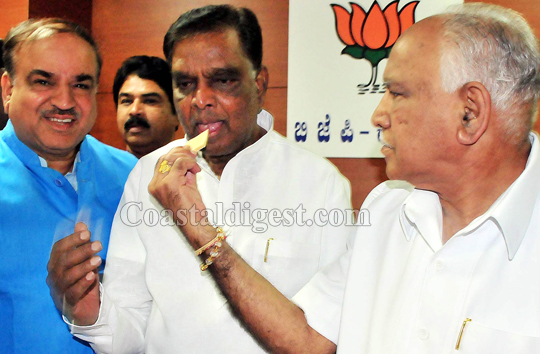Bengaluru, Aug 3: Karnataka Chief Minister BS Yediyurappa tweeted late Sunday night that he had tested positive for the novel coronavirus.
In a brief post on Twitter, Mr Yediyurappa said that he was fine but had been hospitalised on the advice of doctors. While his daughter Padmavathi has also tested positive for the virus, the Chief Minister's son, Vijayendra, has tested negative.
The Chief Minister's media team has said he has been admitted to Manipal Hospital. Mr Yediyurappa, 77, also requested those who had come in contact with him to be wary of Covid symptoms and self-isolate.
"I have tested positive for coronavirus. Whilst I am fine, I am being hospitalised as a precaution on recommendation of doctors. I request those who have come in contact with me recently to be observant and exercise self-quarantine," the Chief Minister's tweet read.
The testing of the Chief Minister was done as part of the routine weekly tests he undergoes along with his staff. The results of Mr Yediyurappa's gunmen and security staff, around 50 of them, are expected today.
Staff members at Mr Yediyurappa's home office, Krishna, had tested positive early last month.
At that time Mr Yediyurappa said: "I am going to discharge my duties from home from today for the next few days in view of some of the staff in the office-cum-residence Krishna testing positive".
Mr Yediyurappa had also met Karnataka Governor Vajubhai Vala in Bengaluru on Friday. State Home Minister Basavaraj Bommai was also present at the meeting.
The Chief Minister is the second high-profile political leader to confirm testing positive for COVID-19 today; hours earlier Union Home Minister Amit Shah tweeted similar news.
Mr Shah, 55, too said he was "fine" and that he had been hospitalised on the "advice of doctors".
The minister also asked all those who had been in contact with him over the last few days to "please isolate yourself and get your tests done".
The Home Minister was at a cabinet meet last week, at which top colleagues, including Prime Minister Narendra Modi, Defence Minister Rajnath Singh and Finance Minister Nirmala Sitharaman were present.
All Covid norms, including social distancing, were followed at that meeting, sources said.
Last month Madhya Pradesh Chief Minister Shivraj Singh Chouhan tested positive for the virus as well. He has been in hospital since then and tweeted today to say that he was well and, minutes after Mr Yediyurappa tweeted his Covid positive status, he posted a get-well-soon message.
"I pray to God for your speedy recovery, Yediyurappaji," Mr Chouhan wrote.
Mr Chouhan had tweeted a message for Mr Shah too. "Home Minister Amit Shah, may God help you recover soon, so you can serve the nation with full energy. Our best wishes are with you," his tweet read.
Former Karnataka Chief Minister Siddaramaiah also tweeted, saying: "I wish BS Yediyurappa a speedy recovery and to return with good health to continue his work for the people".
Tamil Nadu Governor Banwarilal Purohit also tested positive today, Chennai's Kauvery Hospital, where he has been admitted, said. He is asymptomatic and clinically stable.
On Sunday morning the virus claimed the life of a UP minister - Kamal Rani Varun, 62, died at Lucknow's Sanjay Gandhi Postgraduate Institute of Medical Sciences.
Over the last 24 hours, 54,735 cases were reported, taking the total number of cases to 17,50,723, data from the Health Ministry showed.
The continuing spike in cases over the past weeks comes as India gradually re-opens its economy after more than four months of the world's strictest lockdown. Unlock3, the third phase of easing of restrictions, came into effect on Saturday.
It took just 185 days for India to cross the 17-lakh mark after the first case was reported in Kerala in January; it took 110 days to record the first 1 lakh cases. More than 60 per cent of total cases in the country and over 50 per cent of total deaths have been recorded in July.
Also Read: Karnataka CM is in clinically stable condition: Manipal Hospital










Comments
Besharam Janatha Party..
Bjp wins or not in next election, I got my cash.... Kalli walli people are fools to believe us politicians ... Ha Ha ha
This man is like a Girgit who changes its color based on environment and situation. Till yesterday this man was blaming bjp and today he is praising the party. Tomorrow he will jump to another party and blame bjp. We cant and should not trust politicians as they have no faith and trust. Money and seat are their belief.
Add new comment